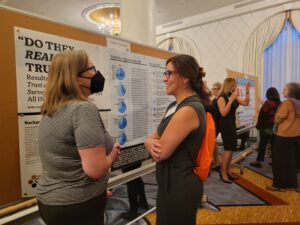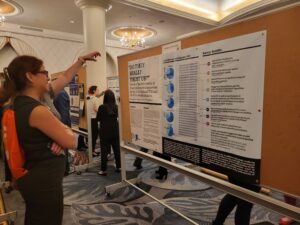Six people from the Indiana Clinical and Translational Sciences Institute (CTSI) represented the organization at the CTSA Program Annual Meeting / Fall CLIC Meeting this month. The theme of the in-person event was, “Achieving Health Equity through the Science of Translation,” and was held in Washington, DC.

Sylk Sotto presenting at CLIC meeting
Sylk Sotto, EdD, director of All IN for Health, presented a poster on behalf of the Indiana CTSI about trust and trustworthiness. Sotto said the goal of the study was to measure trust in biomedical research and healthcare organizations, as well as evaluate how to improve recruitment for All IN for Health.
“Trust is essential to mutually respectful relationships, especially in community-engaged research,” said Sotto, who is also a co-director of Workforce Development for the Indiana CTSI. “A lot is at stake. The critical role that trust plays continues to be documented and highlights the gap in understanding the extent to which initiatives such as All IN for Health can improve trust between the community and researchers, and reaffirm the responsibility of healthcare professionals and researchers to become more trustworthy.”
The poster was based on a research engagement survey which was sent to more than 13,000 volunteers from the All IN for Health research participant registry. More than 600 people participated in the study, which included 36 survey questions. The research team also conducted interviews with three focus groups.
Some notable findings include:
- 59 percent believed that healthcare organizations put money above patients’ needs.
- 50 percent disagree that patients get the same medical treatment regardless of race and/or ethnicity.
- 67 percent think it is safe to participate in medical research, yet 79 percent had never been asked to participate in medical research by their doctor.
- About 30 percent think that medical researchers act differently toward minority participants.
- 10 percent believe that medical researchers select minorities for their most dangerous studies and some medical research projects are secretly designed to expose minoritized groups to diseases.
- Participants suggested what would make them more comfortable in participating in medical research: (1) if they were asked by their doctor, and (2) if the institutions involved had better education programs and public messaging about medical research.

Sylk Sotto presenting at CLIC meeting
“I was very concerned to see the results of this study,” said Sotto. “This population willingly engaged in a research recruitment registry, making their lack of trust in systems such as healthcare organizations and medical research quite alarming. Amongst the general population, trust in scientists is now below pre-pandemic levels. We understand the importance of understanding our communities’ trust in medical research and know we must critically assess our own trustworthiness, as well as the authenticity of our outreach and recruitment efforts.”
The CLIC meeting had two keynote sessions. The morning presentation was by Robert Califf, MD, who is the commissioner of the Food and Drug Administration. The afternoon keynote session was about the future of the National Center for Advancing Translational Sciences (NCATS) with Joni Rutter, PhD, who is the director of NCATS, Michael Kurilla, MD, PhD, the director of the Division of Clinical Innovation at NCATS, and Laura James, MD, from the University of Arkansas for Medical Sciences.
“We were excited to hear how aligned the Indiana CTSI is with the NCATS vision shared by Dr. Joni L. Rutter at the annual meeting,” said Michelle Shwery, MS, MBA, chief operating officer of the Indiana CTSI. “Dr. Rutter, who had been serving as NCATS’ acting director was named last week as the new director. She shared her vision of a ‘future with more treatments for all people more quickly’ through bold ideas, impactful programs and new partnerships. The Indiana CTSI is well positioned with all three requirements for success. We are confident thanks to our incredible talent and ambitious goals that our CTSI will be a leader in realizing NCATS vision, advancing health in Indiana and beyond in the decade ahead!”
View other posters presented at the CLIC meeting here.
